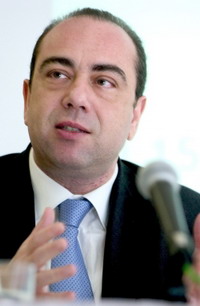EU stays upbeat on partnership deal with Russia

Despite the fact that a Russian ban on Polish meat and plant products remained unresolved after weekend talks, the European Union remained optimistic Monday about negotiations for a comprehensive but delayed strategic partnership accord with Russia next month.
EU officials said that while EU Health Commissioner Markos Kyprianou failed to convince Russian Agriculture Minister Alexei Gordeyev in Cyprus to end a 2005 ban on Polish meat and plant imports they remain optimistic the partnership talks can be launched at a May 18 EU-Russia summit.
"We are not yet quite ready to (give) the starting shot for negotiations," said German Foreign Minister Frank-Walter Steinmeier on arrival at an EU foreign ministers meeting. He and EU External Relations Commissioner Benita Ferrero-Waldner were optimistic that that will happen at the May 18 summit in Samara, Russia.
The EU leaders wanted to launch the talks last year. They proposed detailed negotiations for a strategic partnership with Russia aiming to secure fair trade and investment conditions in Russia for EU energy companies. It would replace a lower-profile 1997 deal.
But at a Nov. 24 summit in Helsinki, Finland, Putin opposed giving foreigners easy access to Russia's vast energy sources or breaking up state monopolies that pump oil and gas and ferry it to domestic and foreign clients.
Fair trade in and access to energy is an issue of growing concern in western Europe, which is increasingly dependent on Russian oil and gas.
Further complicating the matter, Poland responded to the Russian import ban by vetoing the start of any negotiations on the partnership accord, aggravating the EU's already soured relations with Russia.
EU officials are dismayed by what they perceive as Russia's disregard for the rule of law in energy and other fields. On Monday, Sweden's foreign minister, Carl Bildt, highlighted concern over police tactics in dispersing anti-government demonstrators in Moscow and St. Petersburg recently, saying it amounted to "police brutality."
The EU foreign ministers were to meet with their Russian counterpart, Sergey Lavrov, over dinner Monday.
Their meeting comes three days after EU Trade Commissioner Peter Mandelson said EU-Russia relations have nose-dived to "a level of misunderstanding or even mistrust" not seen since the end of the Cold War.
He said each side "suspects the other of double standards. Both believe the other is using the energy weapon as an instrument of politics."
Poland has shown no signs of dropping its veto of the partnership talks with Russia and counts on its EU partners to show solidarity with Warsaw. Poland joined the EU in 2004, together with seven other ex-Soviet satellites or republics, as well as Cyprus and Malta.
At the weekend talks in Cyprus, Kyprianou said the two sides were unable to move beyond simply identifying the points of disagreement in the import dispute and committing to continuing discussions. He blamed the Russian side for the failure to reach an agreement.
Subscribe to Pravda.Ru Telegram channel, Facebook, RSS!




